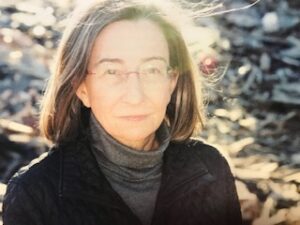
Digging into the Earth for Ecojustice and Wellness
“When we heal the earth, we heal ourselves.” This quote from environmentalist David Orr expresses the importance of our interconnection with our earth. For my undergraduate students, especially in the midst of the COVID pandemic, an immersion into nature contributes to both physical and mental wellness. The idea of inclusive care—for self, for others, and for the environment—extends human rights and highlights the political and spiritual dimensions of ecojustice. In my teaching experience, these connections are best made with community partners.
Students in my Religion and Ecology class work in practicum teams as a key component of the theory and praxis focus of the course. One partnership is with the Agnes Scott Center of Sustainability. Student teams work with the staff on a practicum project in several areas: horticulture (organic garden), seed library (with the college library), trees, Audubon sanctuary area, green buildings, alternative energy, waste diversion, and sustainability education in dorms. Some of the projects are research and development for the future, such as for the renovation of the college greenhouse. Depending on the semester and the needs of the Center, students have done invasive species removal, built birdhouses, created a campus bird guide, designed an organic landscape for a grassy area over a large geothermal unit, written a proposal for natural landscaping (a “green” campus lawn), built fairy houses, designed an aromatherapy garden, written a proposal for connections of the dining hall with local organic gardens, among other things. Connecting the course material with a hands-on project is a way for students to explore concrete ways of being part of sustainability work on our campus.
Trellis Horticultural Therapy Alliance, a local Atlanta nonprofit organization, also provides practicum opportunities for community partnership. Trellis’s mission is “using the power of gardening and nature to improve the lives of people living with disabilities and chronic illness by providing purpose, fostering independence, and creating community.” The partnership began with an invitation to the organization’s founder, environmental scientist Rachel Cochran, to be a guest speaker in class. The purpose was to raise awareness on the practice of therapeutic horticulture and the benefits of gardening and immersion in nature. Trellis (Trellis Horticultural Therapy – Planting Seeds of Possibility) is a member of the American Horticultural Therapy Association (American Horticultural Therapy Association). This partnership provides students with opportunities to engage a variety of wellness and social justice issues, including: food insecurity, nonprofit organizing, climate change, sustainable living, resilience and mental health, as well as experience working in non-profit organizations (including grant writing, leadership, and career exploration). Students work in various locations: the Ability Garden at a local arts center that services seniors, veterans, disabled adults, and children with autism; a local community garden plot with men in a drug and alcohol recovery program, and the Dignity Garden behind a day center for seniors with dementia at a strip mall (and a student project of a fundraising video for Georgia Gives Day that raised $9000 for the organization). Several students continue to volunteer with Trellis or do internships after the semester ends, including one summer internship with their program at an organic farm at a transitional correctional institution for women felons.
A basic pedagogical concept is that students become agents of knowledge about the local issues around ecojustice and climate change. They also become visionaries of the possibilities for change. Students often encounter institutional blocks: around certain traditional aesthetics of campus lawns, around the demands of the local movie industry that frequently uses our campus for filming, around issues of funding (a renovated greenhouse would also require rejuvenating the faculty position in Botany), around issues of acceptable community partnerships, and around the general limits of how far an institution will invest in environmental justice.
Amidst the general apocalyptic mood of global warming and dangerous (albeit EPA approved) pesticides in our campus grass, sprayed by poverty-wage outsourced staff, the course framework of environmental racism in the US South and the moral failure of a capitalist system, there is also the wake-up call and solutions of Project Drawdown, and course readings from Braiding Sweetgrass to Georgia Interfaith Power and Light to the Coalition of Immokalee Workers. The issues around ecological justice can be overwhelming. Clearing paths for wheelchair accessibility in a garden, planting and harvesting kale, preparing an organic dinner with men in a recovery program, or crafting with middle schoolers and seniors can provide new vision and energy, and shared community and wellness.
Leave a Reply